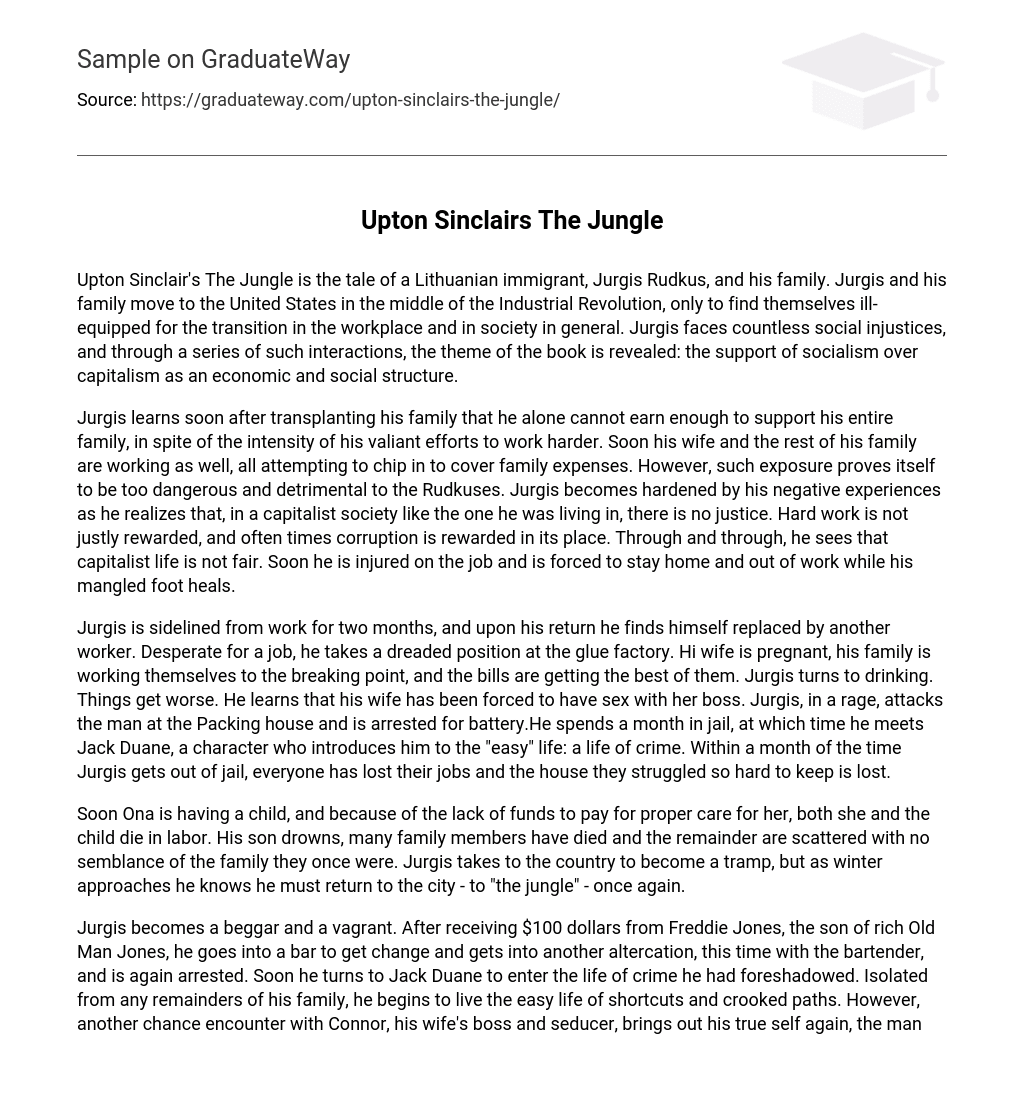Upton Sinclair’s The Jungle tells the story of Jurgis Rudkus, a Lithuanian immigrant, and his family, who relocate to the United States during the Industrial Revolution. Unfortunately, they are unprepared for the changes in the workplace and society. Jurgis experiences numerous social injustices, which ultimately highlight the book’s theme: advocating for socialism as a better economic and social system compared to capitalism.
Jurgis discovers shortly after moving his family that he cannot singlehandedly earn enough to support his entire family, despite his valiant efforts to work harder. Eventually, his wife and the rest of his family also start working in an attempt to contribute to family expenses. However, this exposure proves to be too dangerous and harmful for the Rudkuses. Jurgis becomes stronger and more determined after the negative experiences, as he realizes that there is no justice in a capitalist society like the one he resides in. Hard work is not fairly rewarded, and corruption is often rewarded instead. Throughout it all, he witnesses the unfairness of capitalist life. Consequently, he sustains an injury on the job and is compelled to stay home and refrain from work until his injured foot heals.
After being unemployed for two months, Jurgis finds out upon his return that he has been replaced by another worker. Desperate for employment, he reluctantly accepts a position at the glue factory. Simultaneously, his wife is pregnant and their family is overwhelmed and exhausted from excessive work while struggling to pay their bills. Jurgis, in despair, turns to heavy drinking which only worsens the situation. To his dismay, he discovers that his wife has been forced into having sexual relations with her employer. Enraged by this revelation, Jurgis assaults the man at the Packing house and subsequently gets arrested for assault. He serves a month in jail where he meets an individual named Jack Duane who introduces him to a life of crime described as “easy”. Shortly after Jurgis’ release from jail, every member of the family loses their jobs leading them to eventually lose their cherished home that they fought relentlessly to keep.
Soon, Ona becomes pregnant and due to the family’s financial struggles, she and the child both tragically pass away during childbirth. Additionally, Jurgis’s son drowns and several other relatives have also died, leaving the remaining family members scattered and disconnected from their previous united existence. Jurgis eventually decides to leave for the countryside and adopts a nomadic lifestyle, but as winter approaches, he recognizes the necessity of returning to the city, known as “the jungle.”
Jurgis transitions into a beggar and vagrant, but his fortune changes when he receives $100 from Freddie Jones, the wealthy son of Old Man Jones. He visits a bar to exchange the money but ends up in another altercation with the bartender, leading to his arrest once more. Seeking a different path, Jurgis turns to Jack Duane and embraces a life of crime that he had foreseen. Cut off from his family, he starts living a life of shortcuts and deceit. However, an unexpected encounter with Connor, his wife’s boss and the person who seduced her, reawakens Jurgis’ true self. He chooses to defend his moral principles, even when it comes at personal cost. After once again assaulting Connor, Jurgis gets arrested but flees on bail. Through sheer luck, he stumbles upon a socialist meeting while searching for food and shelter. This encounter marks the beginning of a substantial transformation in his life.
At the meeting, Jurgis discovers the potential of the working class to effect change. He subsequently reunites with his daughter, Marjia, who is battling drug addiction and working as a prostitute to support the family. The narrative concludes with a blissful socialist resolution: Jurgis secures employment at a socialist-run hotel, solidifying his destiny. Both he, the fighter, and Marjia, the victim, begin rebuilding their lives and striving for improvement.
While Sinclair’s book simplifies socialism and portrays capitalism in a sinister light, I appreciate his attempts to depict the injustices of capitalism. However, I believe that socialism is not a simple solution like it appears to be for Jurgis in The Jungle. Corruption exists in all economic and social-political structures throughout history and the future. I don’t have a solution to this problem, but I do know that socialism is not the straightforward answer that Sinclair presents.
Bibliography:





